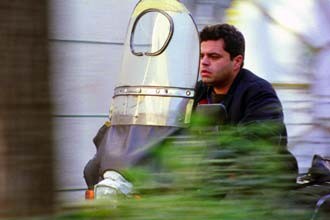|
By Steven G. Kellman In A Taste of Cherry, Iranian filmmaker Abbas Kiarostami told the story of one man's urgent search for a stranger willing to bury him after he takes his own life. The film is a stark and forceful allegory about why we live and how we die. Kiarostami wrote the screenplay to Crimson Gold, which also dramatizes an elemental confrontation between a solitary man and his despair. Beginning and ending with the bungled burglary of a jewelry shop in Tehran, the film was judged "too dark" to be shown in Iran. One should not dismiss lightly the need to make darkness visible. Filling almost every frame of Crimson Gold is a most unlikely protagonist, a pudgy, sullen schlep named Hussein (Emadeddin) who works an evening shift delivering pizzas. A wounded veteran of the Iran-Iraq war, he is also a part-time petty thief, mostly, in cahoots with a garrulous fellow named Ali (Sheisi), snatching purses. Although Hussein never seems more content than when he is cruising the city streets alone on his motor bike, he never seems genuinely cheerful about anything, certainly not the prospect of marriage to Ali's sister (Rayeji), who remains veiled and unnamed throughout the film. When Hussein goes with her to buy a nuptial ornament, he is snubbed by the snobbish master jeweler, who senses little profit in waiting on a man who cannot tell the difference between one kind of gold and another.
But, except for its violent opening sequence, the lunacy in Crimson Gold remains subdued. When Hussein seems upset about something, his fiancée interrogates him about his feelings. "Please stop talking," he says, and very little else. This Farsi film is a study in quiet desperation, the portrait of an ordinary man who can no longer abide the merely ordinary. To reinforce his emphasis on the evil of banality, Panahi employs the familiar repertoire of Neorealism - natural lighting, long takes, non-professional actors, eye-level shots, actual sound. In the opening burglary scene that, repeated at the end, frames the entire story, the camera remains stationary while violent action occurs just outside the frame. We are placed into an unjust world in which resignation occasionally erupts into fierce despair, beyond our control or understanding. Crimson Gold does not glitter; it galls. •
|


